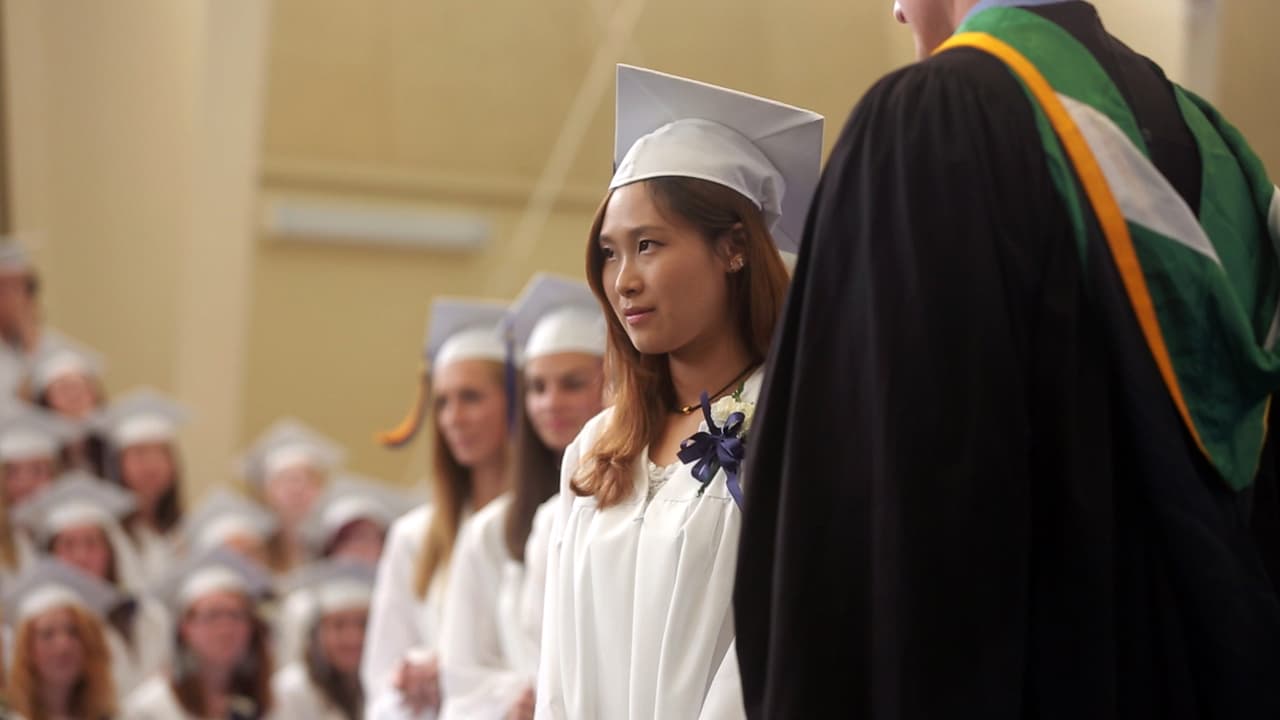

Being an International student myself, it's easy to relate to this carefully crafted documentary. America and China are two very different countries with vastly different cultures. The film looked closely on the students journey of growing up within this cultural clash and did a great job portraying the struggles of young adults. It is hard, for us, being separated from our parents, facing an entirely new country with complete confidence. The documentary attempts to grasp the deeper intentions of Interantional students by asking questions to its audiences. Questions like, "Why are they doing this?", or, "In which way are we different from each other?" are asked and answered through the lives of these two narrators in the course of three years. Hopefully, this documentary will serve as a pioneer on the understanding between these two cultures, and further, teaching us how to learn from our differences. We are always more the same then we are different.
... View MoreEarly on in Maineland, after a series of entrance interviews vetting potential high school students from Mainland China for candidacy for an international exchange to prestigious American boarding school Freyburg academy, the admissions director chortles at the camera, "I think they're just telling us what we'd like to hear." It's a beautifully subversive moment. On one hand, it microcosmically unearths the potential dissonance between cross-cultural values (the rampant individuality revered by the States vs. the pressure towards order and homogeneity in China) the rest of the film will continue to gently knead the wrinkles out of. It's a sneaky p*ss-take on a fundamentally inauthentic interview process, showing that, no matter what country they come from, most teenagers are fundamentally the same at heart. And, it's also a deceptive moment of self-reflexivity (after all, what is a documentary if not subjects, with varying gradients of authenticity, telling audiences what they think they'd like to hear?) that director Miao Wang subtly plants the seed for, then, playfully, proceeds to never again address. On the surface, Maineland is a fly-on-the-wall account of a group of these Chinese high schoolers spending a significant chunk of their teen years acquainting themselves with life in the U.S. at Freyburg. But it's also one of the more understated but insistent cinematic parables of globalization of the past several years, poking at roots of internationally symbiotic culture and commerce that will only continue to grow in tandem with the film's burgeoning protagonists. Wang's directorial hand is as quietly tongue-in-cheek as it is unostentatious, her film a series of vignettes offering the briefest peeks into the lives of the students. Through a scattering of interviews and mirthful documentary eavesdropping, and focalized through two suitably contrasting leads - extroverted, giggly social butterfly Stella, and more withdrawn, philosophical Harry - Wang offers up snapshots of the student experience. In the 90 minutes we spend in their presence, we get fleeting, deliberate peeks into their social circles (integrating with the locals, and, largely, finding solace in hanging with the other Chinese students), their schoolwork, their personal existential struggles, and - perhaps most important - what to wear? Seamless and beautifully shot as Maineland is, there's also an unshakable sense of Wang determining her own guiding focus throughout the course of making the film (at the Q&A following the film's Canadian premiere, she shared an amusing anecdote of having a prospective third 'lead character,' only to realize the girl in question was profoundly antisocial, and only ever wanted to sleep - a somewhat less compelling talking head). As such, several glimmers of subplots are flirted with then abandoned (one, detailing several of the Chinese students in a film class making their own meta-documentary on how their presence affects the Freyburg community is too fascinating for its omission here not to be a tragedy). These ably sketch out a more expansive experience for the students beyond the parameters of the camera lens, but also, consequently, make the film's pacing somewhat wobbly throughout. The film's premise leaves countless avenues of theme and social commentary ripe for the picking, but, for the most part, Wang remains coyly mum on larger conversations you can tell she's just itching to play up. Instead, she lets the tiniest moments of poignancy speak volumes without crass accentuation - for class commentary (inescapable in the burgeoning economy of international tuition), the briefest teasing sequence of Stella agonizing over which of her several pairs of Jimmy Choos to wear to prom. For their part, the teens themselves are impressively candid and lucid with their intentions for the exchange (dodging rigorous Chinese post-secondary exams; advancing future career prospects; their parents wanting them to) - though, again, maybe they're just telling us what we want to hear. Conversely, many of the film's more revealing - and comedic - moments have several well-intentioned New Englander teachers tripping over their words trying to wax poetic about the influx of specifically Chinese international students, paradoxically exposing themselves as somewhat less worldly than they'd like to present. The Freyburg admissions directors are more forthright: international tuition is what keeps their academy alive, and Chinese students alone comprise nearly half of that audience. It's simply too big a market not to tap into, even while postulating that both Chinese and American socioeconomic and cultural infrastructures will continue to change in interesting, imperceptible, and unpredictable ways as a result of the cultural cross-pollination. It's a sly, sobering breath of fresh air in a Western cultural landscape increasingly fraught with suspicion and hostility towards immigrants (another social commentary Wang, somewhat problematically, sidesteps). Instead, Wang's film, rather than aggressively taking the topical bull by the horns, opts for a fundamentally friendlier, timeless take on a timely issue. Maineland is an unassuming treat - a gentle, wryly tongue-in-cheek meditation on adolescence, diasporic cultural identity, and the conflation of education and economy. It's one of the more subtly astute conversations on globalization packaged in a thoroughly pleasant, if not overtly groundbreaking, 90 minutes. And that is telling us exactly what we want to hear. -8/10
... View MoreAn incredibly lyrical film that is at times a quiet discussion about culture, at times an open meditation on coming-of-age. The subject matter is timely, characters are engaging, and the original score is beautiful. But the real star is the cinematography where each scene is carefully juxtaposed against a scene later. While the narrative unfolds through two years of teenage lives, recurring images, symbols and dialogues remind us that life is never truly linear. And so little by little, we are inevitably drawn to the journeys of the two young protagonists. Who will they become? Will they become who their parents (who sent them from Chinese mega-cities to rural America) wish them to be? Will they become who they themselves thought that they would be? Or will they become who we the viewers wish them to be? In the process of watching these teenagers grow up, we come to see ourselves more (and perhaps in equal parts less) clearly in a complex world.
... View MoreMaineland was well-received at its world premiere at SXSW Film Festival. It is an interesting look at Chinese exchange students going attending a private school in Maine. The director does an intrepid job following the young high school students lives from urban China to the contrast of rural Maine. Some of the scenes are certainly entertaining, but the film seems to lack a clear direction and story arc. It does too little to clearly explore the sociological impact of both the young people and how they impacted those around them. They didn't really focus on the racism they experienced or the impact on their peers. There was too much of just cinema verite presentation without really clearly steering the narrative clearly enough. Often the exchange students seem just like any other student coming-of-age, but that doesn't provide a very intriguing story for the audience. A different editing of the same material might well have produced a more compelling portrait of what happens when cultures collide.
... View More